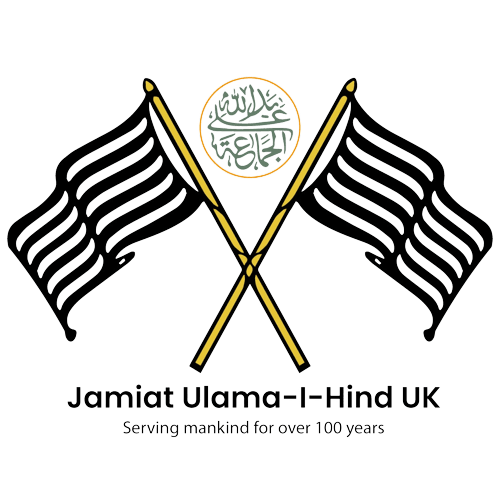
INDEPENDENCE
ROLE IN INDEPENDENCE
First Conference:
The first conference of the Jamiat was held at Amritsar on December 28, 1919 chaired by Maulana
Abdul Bari of Farangi Mahal to lodge protest against the continued imprisonment of Shaikhul Hind and
Maulana Azad.
Non-cooperation Movement:
Following the resolution of Non-cooperation adopted by Allahabad conference in June 1920. The
movement was formally launched on August 31, 1920.
Fatwa of Non-cooperation:
On July 19, 1920 Shaikhul Hind issued a fatwa in favour of non-cooperation which was reconfirmed by
500 Ulamas. The leaders and workers of Khilafat committee and the congress went into struggle
against imperialism armed with this fatwa. The British Govt. seized it.
Foundation of Jamia Millia Islamia:
On October 29, 1920 Shaikhul Hind laid the foundation of Jamia Millia Islamia.
Imprisonment of Jamiat Leaders:
At the Karachi Khilafat conference in July 1921, the call of non-cooperation given by Maulana
Hussain Ahmad Madani caused his imprisonment along with Maulana Mohammad Ali Jauhar, Maulana Shaukat
Ali, Dr. Kitchlew and Jagatguru Shnkar Acharya.
Boycott of foreign goods:
Resolution of boycott of foreign goods was passed by Jamiat conference in Nov. 1921 under the
leadership of Maulana Abul Kalam Azad.
Relief to Mopillas of Malabar
Boycott of Assemblies (December 1922)
Call for complete independence by Maulana Hussain Ahmad Madani (January 1924)
Jamiat was the first to declare boycott of the Simon Commission (December 1927)
Participation in all parties conference at Lucknow and rejection of Nehru Report (1928)
Cooperation with congress (Amroha conference, May 1930)
Civil Disobedience Movement wherefore prominent leaders of Jamiat were imprisoned (1930)
Opposition to the infamous Sharda Act for it interference in Muslim Personal Law.
Composite nationalism and theory of territorial Nation hood:
Maulana Syed Hussain Ahmad Madani advocated the idea of composite nationalism and joint struggle
of
all religious communities against the British and justified inter-communal unity and cooperation
on
the basis of the Quran and the Hadith. At a time when ideas of religion based nationalism were
being
advocated by the Hindu Mahasabha and the Muslim League. Maulana Hussain Ahmad Madani advanced
“the
theory of territorial national hood” saying that it is “not necessary that a nation, to be a
nation,
should share the same religion and culture”. Now a days he said, “nations are made by
homelands.”
Maulana Madani and the Ulama like him have been described by Peter Haardy as representing “a sea change in the kind of assumptions Ulama were wont to make about the nature of solidarity of the Islamic community.”
Declaration of non-cooperation in the war effort (world war II, 1939-45).
Complete Independence:
In the Jamiat Ulama Moradabad conference held at Bachhraon (April 23-25, 1940) Maulana Hussain Ahmad
Madani raised the question of Indian independence. As a result he was arrested and imprisoned in
Naini Jail.
Quit India:
On August 5, 1942 Jamiat gave a call to the British to quit India. Thereafter on August 9 the Bombay
session of the Congress passed the famous Quit India resolution which led to the arrest and
incarceration of the Congress and the Jamiat leaders.
Opposition to the idea of Pakistan:
After 1942, Jamiat Ulama resolutely opposed the idea of Pakistan and its leaders especially Maulana
Hussain Ahmad Madani were victims of Muslim League violence.
In 1945 at the 14th conference the Jamiat passed its alternative formula for partition.
ROLE POST-INDEPENDENCE
Before independence its main goal was to struggle for freedom of India. After realization of that goal it concentrated upon the religio-socio-economic as well as educational uplift of Indian Muslims.
Post partition riots:
The frightful wave of riots that attended upon partition swept through Punjab, Himachal, Delhi,
Haryana, West U.P., Bihar etc. demoralized the Muslims. In that situation, it was the death-defying
courage of the Jamiat leaders that restored tha confidence of the Muslims in India.
Lucknow Conference:
In those very turbulent times that Jamiat called a conference in Lucknow which is unprecedented in
significance. It not only gave courage to the demoralised community but also declared abdication
from politics.
Secularism:
In the post independence period the Jamiat made notable contribution towards making India secular
state and farming a secular Constitution.
Protection of minorities:
Provisions in the Constitution for protection of minorities, and special facilities for their
development, are the fruits of the labours put in by the Jamiat General Secretary, Maulana Hifzur
Rahman in his capacity as a member of the Constituent Assembly.
Muslim Aukaf:
In 1951 the draft of a Bill for protection of Muslim Aukaf was presented in the Parliament through
Mr. Mohammad Ahmad Kazmi. The Bill was passed on March 13, 1953.
Relief to communal riots victims:
The Jamiat has been active in providing relief and getting justice for the victims of communal riots
that have occurred from time to time.
Communal violence:
Communal violence:
Maulana Hifzur Rahman and Maulana As’ad Madani energetically raised the problem of communalism and
communal violence in the parliament.
Conventions:
With the objective of checking the growth and spread of communal violence Maulana Hifzur Rahman
convened a Muslim Convention in 1961 and Maulana As’ad Madani organized Democratic Convention (1964)
and an Anti Communal Convention (1991) which yielded positive results. It was followed by a much
larger Convention under same issue on 12th February 1993.
Save the country movement:
To defeat the forces of communal fascism Maulana As’ad Madani launched the “Save the country and
community” movement in 1979. In its first phase (July 9-25) 2, 226 people courted arrest and in the
second phase (October 2-15) 4, 611 people went to jail.
Qadiani blasphemy:
To counter Qadiani blasphemous activities in India Maulana Syed As’ad Madani convened a grand
conference to highlight the concept of the finality of Prophet hood at Urdu park, in front of
Shahjahani Jama Masjid on June 14, 1997.
Bill against religious places:
The Bill introduced by U.P. Govt. interfering with the Constitutional right of freedom of religion
was effectively opposed by JUH culminating into unprecedented mass rally held at Ram Lila Ground,
New Delhi on 13th May 2000.
